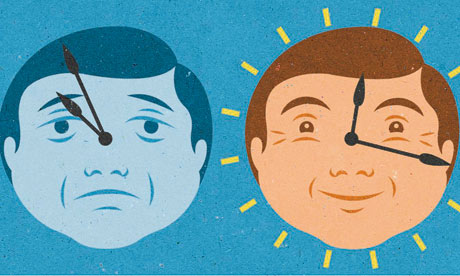
According to the old wives' tale, nobody ever sees a dead donkey, and as George Carlin observed, "You never see a really big, tall, fat Chinese guy with red hair", either. To which I'd like to add: you never meet someone who describes themselves as an "afternoon person", do you?
The population divides into larks, night owls and people who are neither. The distinction often seems to have as much to do with self-image as energy cycles: it's close to sacrilegious to be a morning person if you're in a band, say, while hard-charging celebrity businesspeople seem obliged to tell interviewers that they wake at 4.30am. (That's the reported rising time of both Disney and Apple's current chief executives, though as this column has noted before, sleep studies suggest that such claims are often exaggerated.)
Nobody, on the other hand, feels they come into their own about an hour after lunch. The "afternoon slump" enfolds us in its toxic mist of lethargy and irritation. It seems to be global; not long ago, sociologists analysed the "mood words" in 2.4m tweets and discovered that the Twitterverse gets crotchety in the afternoon in India, Europe, Africa, New Zealand, and North America. "I really dislike afternoons," said Kingsley Amis, who wrote best in the mornings and evenings. The only remedy, he felt, was "drinking more cups of tea until the bar opens at six".
Actually, that's far from the only remedy. Opinions differ on whether the slump can be avoided entirely – ultimately, there may be no arguing with circadian rhythms – but the world of productivity books and blogs abounds with suggestions. You could avoid eating too many carbohydrates at lunchtime, and make sure you get some sunlight; if, unlike me, you're capable of napping, you could take a "caffeine nap": drink coffee, drift off, then wake as the caffeine hits your brain. Failing all that, to the extent your job allows, you can schedule your day so the slump coincides with brainless tasks.
But here's a possibility striking enough to jolt you from your depleted haze: what if those groggy afternoon hours might be some of your most creative? As the British Psychological Society's Research Digest reported recently, psychologists in Michigan divided hundreds of students into night owls and larks, according to their own declared preferences for times of day, then posed them problems that demanded insightful thinking. (Such as: a coin dealer calls the police when he's offered a valuable-looking coin that says it was minted in 544BC. How does he know it's fake?) Some faced these tasks around 9am, others around 4pm. By a clear margin, larks did best in the afternoon and night-owls in the morning – the opposite of what you'd expect. The unfocused dreaminess of the "off" hours seemed to aid creative thinking. The same didn't apply to more analytical problems, involving mental arithmetic.
Anthony Burgess – who may be the "afternoon person" exception who proves my rule – was on to this years ago. "The unconscious mind has a habit of asserting itself in the afternoon," he told the Paris Review. "The morning is the conscious time, but the afternoon is a time in which we should deal much more with the hinterland." Whether you think of yourself as a morning or an evening person, perhaps it's time to rethink. And perhaps you should be doing that thinking at your drowsiest time of day.
oliver.burkeman@theguardian.com; twitter.com/oliverburkeman

